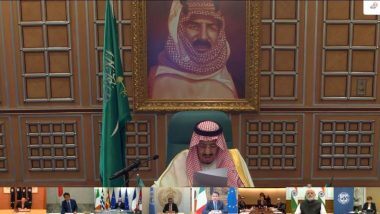‘This Has Changed Everything’: Saudi Economy Shaken by Oil Crash
The meltdown in oil markets is turning back the economic clock for Saudi Arabia, putting it on track for the deepest contraction in two decades.

By Bloomberg
The meltdown in oil markets is turning back the economic clock for Saudi Arabia, putting it on track for the deepest contraction in two decades.
Already under lockdown to contain the spread of the coronavirus pandemic, the world’s largest crude exporter is bracing for a second impact from the oil rout and unprecedented production cuts negotiated by OPEC and its allies. Both will slash government revenue, and in turn derail a fragile economic recovery. Brent crude traded at under $19 a barrel on Tuesday — a quarter of the level Saudi Arabia needs to balance its budget — leaving officials with limited options to offset economic pain without crippling public finances.
“This has changed everything,” said Monica Malik, chief economist at Abu Dhabi Commercial Bank. “So much of the recent recovery was based on the fact that the oil price had been above $50–$60, providing support to economic activity, and that’s just been decimated.”
The setback presents difficult choices for Crown Prince Mohammed bin Salman. After the last oil price slump, from 2014 to 2016, he announced a major economic transformation plan. While officials have made significant progress — developing fledging sectors like entertainment and lifting non-oil revenue with taxes and fees — the economy still hinges on crude. Now the price shock is threatening many of the government’s gains, making it difficult to fund projects and investments when over 60% of revenue this year was meant to come from oil.
Ricardo Hausmann, an economist at Harvard University, compared the situation facing Saudi Arabia to “war being fought on at least two fronts,” according to a recent presentation for Saudi officials, seen by Bloomberg, that outlined the dual hit from the pandemic and the oil crisis.
“Each shock in itself is huge,” Hausmann wrote. “Both at the same time makes things much more complex.”
Aggressive Measures
So far, Saudi Arabia has reported one of the lowest rates of Covid-19 infection in the region, with less than 12,000 cases among 34 million people. That’s partly due to aggressive measures to slow the spread, steps that are also shutting down swaths of the $779 billion economy.
“Everyone is scared about coronavirus and the lockdown situation, but look, everything is around the oil prices here,” Alsanad said at the time. “If this goes down, you should expect huge implications on anyone’s business.”
As oil prices in the U.S. plummeted below zero for the first time in history, Saudi phones pinged with text messages and tweets asking what it meant for the kingdom.
The collapse in the price of West Texas Intermediate crude has little direct impact for Saudi Arabia, since it sells only about a 10th of its oil to the U.S. The kingdom’s fate is more closely tied to the price of global benchmark Brent crude, which is also falling, in part because of low U.S. prices.
The price rout was partly caused by a supply surge during a bitter oil-price war between Saudi Arabia and Russia — but underlying it is expectations of a drawn-out period of lower demand. Warnings from U.S. President Donald Trump that he’ll consider blocking imports of crude from Saudi Arabia only add to concerns.
Recovery derailed
Many Saudi business owners were looking forward to 2020 after several tough years. Now, economists say they can hardly cut their forecasts fast enough.
Gross domestic product could shrink more than 3% this year in what would be the first contraction since 2017 — and the biggest since 1999 — according to Malik. Unemployment is poised to spike as businesses struggle to stay afloat.
The government’s budget deficit could widen to 15% of economic output, said Mohamed Abu Basha, head of macroeconomic analysis at investment bank EFG Hermes in Cairo. The fiscal shortfall reached 4.5% last year after peaking at just over 17% in 2016, according to the International Monetary Fund.
Despite the grim outlook, many Saudis are grateful for officials’ swift response to the pandemic. Business owners say that the government’s stimulus package saved them from collapse. A few weeks ago, Faisal AlSager — who employs more than 1,500 people at a firm that provides call centers and customer-service solutions — was on the verge of laying off workers as clients pulled back.
But when the government announced it would cover 60% of salaries for some Saudis in the private sector, his company, Etisal International, suspended layoffs.
“Such measures taken by the government will help us at least survive,” he said.
“The cyclicality of the oil industry is not new to the Saudi decision makers,” al-Fawaz said. “They have seen this drama before, so they have experience.”